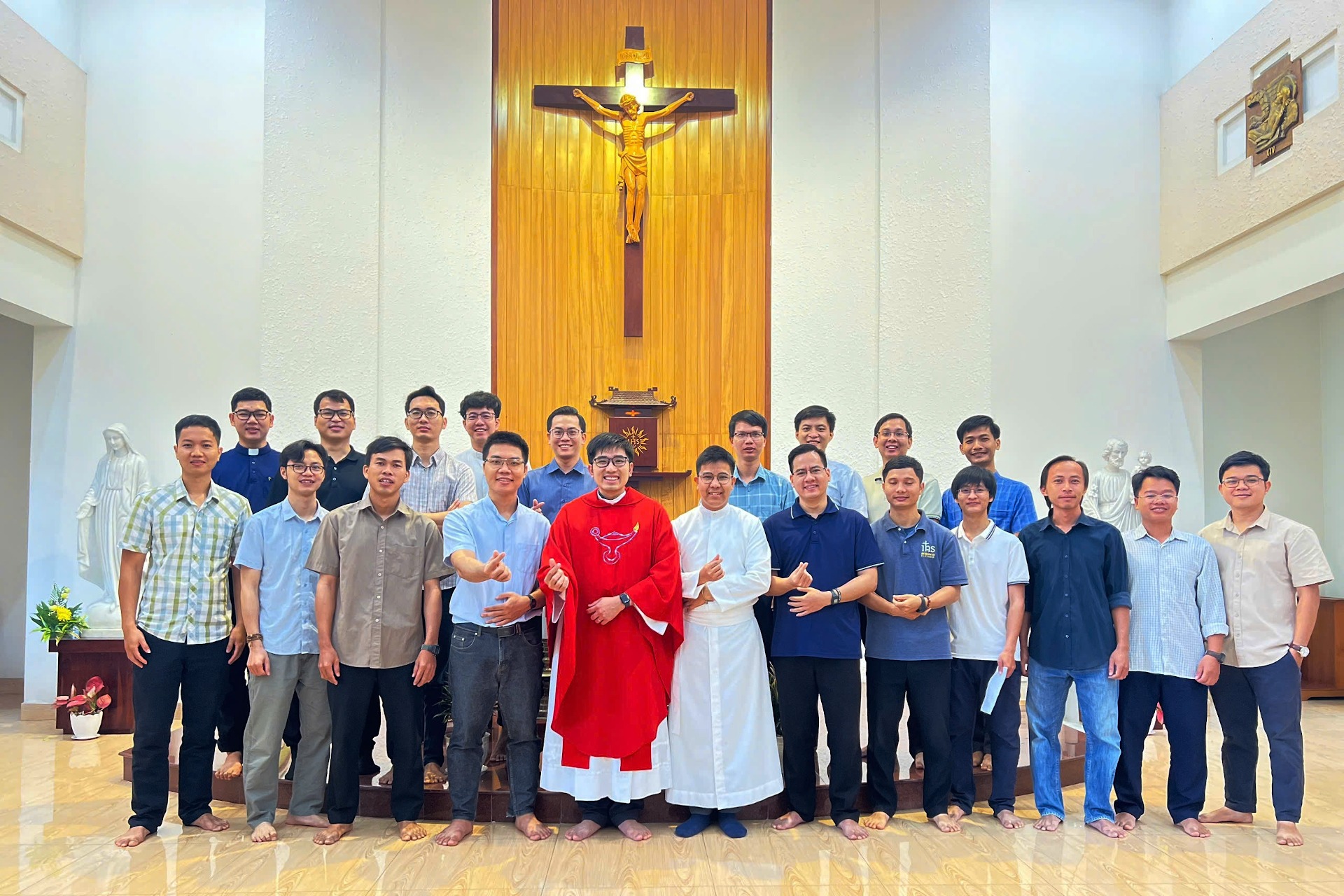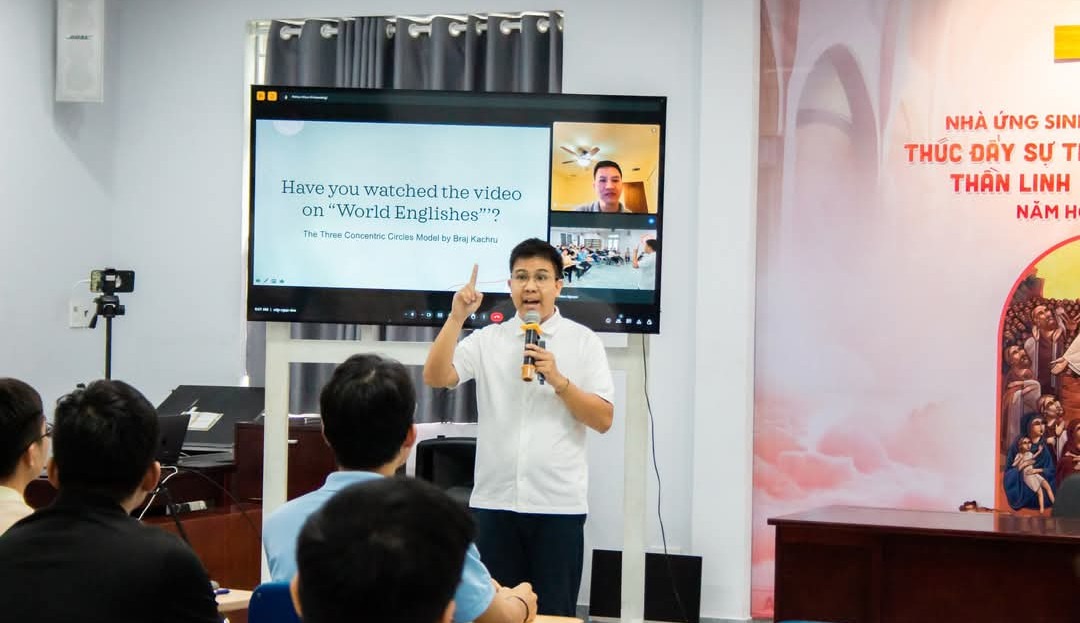 The desire to be a missionary has been with me since I entered the Society of Jesus in the Philippines in 2019, though I never imagined I would be sent to a prenovitiate in a foreign country for Regency. I often associated foreign missionary work with direct service to the poor. This is why, as a young scholastic, I expressed my willingness to be sent to conflict-ridden Myanmar if the opportunity arose. I wanted to be in direct contact with the poor. Yet, here I am in Vietnam, teaching English to prenovices and candidates and assisting in their human formation.
The desire to be a missionary has been with me since I entered the Society of Jesus in the Philippines in 2019, though I never imagined I would be sent to a prenovitiate in a foreign country for Regency. I often associated foreign missionary work with direct service to the poor. This is why, as a young scholastic, I expressed my willingness to be sent to conflict-ridden Myanmar if the opportunity arose. I wanted to be in direct contact with the poor. Yet, here I am in Vietnam, teaching English to prenovices and candidates and assisting in their human formation.
“We’re also poor, Brother Jun,” one prenovice remarked after I shared my story during a table conversation. I simply smiled at his perceptive reply. It takes an honest look at oneself to arrive at such an insight into one’s condition. It requires courage to admit one’s poverty and articulate it. His honest and courageous confession challenged my initial, immature understanding of mission and my availability as a young Jesuit on mission. It revealed my own poverty.
As a novice, I was deeply moved by an excerpt printed on a large vocation promotion tarpaulin that once hung along the novitiate corridors: “A Jesuit, therefore, is essentially a man on a mission: a mission which he receives immediately from the Holy Father and from his own religious superiors, but ultimately from Christ himself, the one sent by the Father. It is by being sent that the Jesuit becomes a companion of Jesus” (GC 32, D.2, n.14). In other words, it is through mission—by being sent—that my desire to be Jesus’ companion finds its fulfilment.
As a young scholastic studying philosophy, I often looked forward to meeting Filipino Jesuit missionaries who stayed with us in the formation community. I cherished sitting with them during meals, listening to their stories about life in their mission. I noticed how their Jesuit lives became more defined as they endeavoured to make themselves available for the greater needs of their mission assignments.
Now that I am a missionary myself, I am beginning to grasp the true meaning of the excerpt I read as a novice and the mission stories I heard as a scholastic. My desire to accompany Jesus in mission is fundamentally rooted in and sustained by the reality that Jesus has faithfully been my companion throughout these years. He has accompanied me through the ebb and flow of responding to the Father’s call. This is especially true where I am now. Young as I am in the Jesuit life, I can say that this phase of formation is, thus far, where I have most palpably experienced Jesus’ company.
It is not unknown that I am the first Filipino Jesuit regent sent to Vietnam. The Vietnamese Provincial Superior even noted that I was ushering in the third wave of foreign missionaries to the Vietnamese Province, contributing to the call for greater interculturality. The first wave was led by Alexander de Rhodes in the 1620s, followed by a second wave in the 1950s. The first group remained in Vietnam until worldwide suppression of the Society of Jesus in 1773, while most missionaries from the second wave had to return to their homelands following Vietnam’s “reunification” in 1976.
 Before this historic mission, in which I am privileged to partake, I find myself confronted with my growing edges. The words of Jeremiah resonate deeply with me: “Ah, Lord God! I do not know how to speak. I am too young!” (Jeremiah 1:6). I do not know how to speak Tiếng Việt. I feel too young to accompany the prenovices in their human formation. I have been missioned to teach English as a foreign language, even though my background is in teaching English as a second language. These and other reservations I raised to God, who assured me: “Do not say, ‘I am too young.’ To whomever I send you, you shall go; whatever I command you, you shall speak…. Do not be afraid…. I am with you…” (Jeremiah 1:7-8).
Before this historic mission, in which I am privileged to partake, I find myself confronted with my growing edges. The words of Jeremiah resonate deeply with me: “Ah, Lord God! I do not know how to speak. I am too young!” (Jeremiah 1:6). I do not know how to speak Tiếng Việt. I feel too young to accompany the prenovices in their human formation. I have been missioned to teach English as a foreign language, even though my background is in teaching English as a second language. These and other reservations I raised to God, who assured me: “Do not say, ‘I am too young.’ To whomever I send you, you shall go; whatever I command you, you shall speak…. Do not be afraid…. I am with you…” (Jeremiah 1:7-8).
In another contemplation, I asked the teenage Mary what made her say yes to the enormous mission of bearing God in her womb. She could have said no; she had every freedom to do so. But she said yes. Mary turned to me and asked, “How could I ever say no to a faithful God—a God who first and always says yes to loving me unconditionally?”
There and then, I came to understand intimately that it was God’s faithfulness to Mary that inspired and sustained her fiat amidst the disheartening tempests of her life as Jesus’ mother. It was this same faithfulness that held her gently as she accompanied Jesus from the crib of joy and life to the cross of sorrow and death. It was this unwavering faithfulness that granted Mary the inextinguishable joy of receiving her beloved Son as her risen Lord. While not explicitly mentioned in the Gospel accounts, St Ignatius of Loyola thoughtfully included in the Spiritual Exercises that the risen Jesus first appeared to his beloved Mother.
God’s faithfulness holds me, too! How blessed I am to be gifted with the Giver Himself—a faithful God, a generous Giver, whose unconditional love gradually melts the hesitations and divisions in my heart. Slowly and patiently, He forms my heart anew, shaping it into the heart of His Beloved Son, whom I desire to know more clearly, love more dearly, and follow more nearly every day (Spiritual Exercises 104).
Unlike what I initially thought, mission—whether local or foreign—is not solely about serving the needs of the materially poor. While direct service to the poor is undeniably integral to the Jesuit life-mission (and must be woven into any Jesuit apostolate), the Spirit has led me to recognise something more fundamental. Mission does not begin with immediately addressing needs—whether material, linguistic, psycho-emotional, or spiritual. It is not simply about doing something; it is about being someone—and being with someone. Thus, mission begins with and flows from a deep, personal relationship with Jesus. Only in this light can I freely and fully respond, with the Lord, to wherever the need is greater.
At present, the greater need lies in teaching English to the prenovices and candidates (whose eagerness, diligence, and simplicity have profoundly edified me!) and assisting in their human formation. And I am deeply happy where I am now.
 Rogelio R Nato Jr SJ is a Filipino scholastic serving his Regency in Vietnam. He lives with the Jesuit community of Our Lady of the Way in Ho Chi Minh City.
Rogelio R Nato Jr SJ is a Filipino scholastic serving his Regency in Vietnam. He lives with the Jesuit community of Our Lady of the Way in Ho Chi Minh City.

